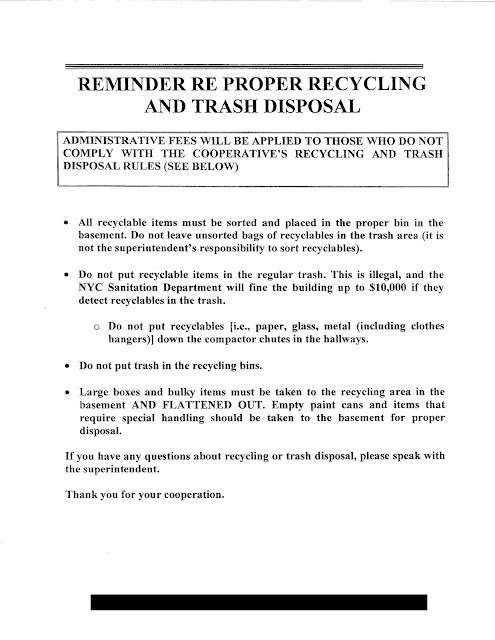Our building maintenance crew is spending a disproportionate amount of time caring for recycling – sorting out trash that should have been recycled, separating items in the recycling bin that should be disposed as trash, and preparing recyclable items to be picked up. This issue has led the building management company to send the below letter to co-op residents.
 |
| Recycling Notice |
Thinking about this from a viewpoint of consumer motivation and marketing, the letter merits a Fail for Creative for tone and clarity.
Below is a rewrite of the letter.
Proper
Trash Disposal and Recycling Helps Everyone – Including You
We recently noticed that some people in your cooperative building are not properly disposing of trash and recyclables. While most residents are taking the right steps, a few are not following procedures. This is illegal and can be costly. If the NYC Sanitation Department detects recyclables in the trash, the building can be fined up to $10,000 – a fine that would have to be passed on to residents through maintenance fees.
Here’s a
reminder of what, as residents of [REDACTED], you need to do:
- Sort and place all your recyclable items in the proper bins in the basement. It is your responsibility to sort items, so please do not leave unsorted bags of recyclables in the trash area.
- Place non-recyclable items in the compactor chutes in your floor’s hallway or in the trash cans in the basement.
- Do not put recyclable items in the regular trash cans.
- Never put recyclable items in the compactor chutes.
- When you have a large box or bulky item, take it to the recycling area in the basement, dismantle it, and be sure to flatten it out.
- When you have an empty paint can or item that requires special handling, take it to the basement recycling area for proper disposal.
Please keep in mind these items that are recyclable:
- Paper of all types, including newspapers, magazines, flyers, mail, and restaurant menus
- Glass, including all bottles
- Plastic, including all bottles and containers
- Metal, including clothes hangers
- Cardboard, including small store boxes as well as shipping boxes from Amazon, Blue Apron, and similar companies.
If you have any questions about recycling or trash disposal, please speak with [REDACTED], your building superintendent. Thank you for helping to keep our costs down, follow city regulations, and support recycling in New York City.
/\/\/\/\/\/\/\/\/\/\/\/\
This rewrite captures the key messages of the original letter while applying some communication Best Practices.
- Personalization. I included the name of the building and the name of the building's superintendent. (Ideally, I would include the name of the recipient. However, this type of letter is placed under every resident's door, making individual personalization impractical.)
- Normative Messaging. In the opening paragraph, I mention that most residents are good people. They take the right steps. The implied message is to be good – like your neighbor.
- Shared Responsibility. While the original letter mentions that the "building" could be fined $10,000, my rewrite reminds co-op residents that such a fine would personally impact them.
- Clarity. My rewrite explains what can be recycled, and how, in carefully laid-out bullets rather than in brackets.
- Positive Reinforcement. I thank residents not only for cooperation but also for helping to save money and support a good cause.
Lessons:
- When motivating consumer behavior, consider utilizing personalization, normative messaging, and a positive focus.
- When explaining recycling procedures, be clear about what can be recycled.